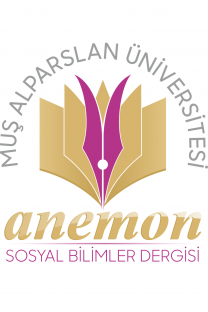An Eriksonian Reading of The Body by Hanif Kureishi: Integrity Versus Despair
Yaşlanan beden ve yaşlılık meseleleri, 21. yüzyıl boyunca Batı medeniyetinin öne çıkan endişeleri arasında yer almaktadır. Tüketim toplumunun yeni hammaddesi olan beden, tıbbi gelişmeler sonucunda değişebilen, hatta diğer metalar gibi alınıp satılabilen bir nesne olarak algılanmaktadır. Bu değişimlerin nedenini belirlemek açısından, Erik Erikson’un yaşlı insanlar üzerindeki sosyal baskının özünü çağrıştıran psikososyal gelişim teorisi, konunun karmaşıklığını anlamada yardımcı olabilir. Erikson, psikososyal gelişim teorisinde, yaşam süreci boyunca her aşamaya özgü belirli görevler ve krizlerle sekiz gelişim aşaması olduğunu varsayar. Bu çalışma, Hanif Kureishi’nin Vücut romanını Eriksoncu psikososyal gelişim kuramı çerçevesinde inceleme amacı taşımaktadır. Kuşkusuz, Kureishi’nin kısa kurgusu, post kolonyal yaklaşımı ortaya çıkaran etnik köken ve kimlik meseleleriyle uğraşıyor gibi görünmektedir. Ancak bu çalışma, Erikson gelişim kuramının son aşaması olan benlik bütünlüğüne karşı umutsuzluğa işaret eden, yaşlılara karşı giderek acımasızlaşan toplumun yaşlanma üzerindeki baskılarını ele alması açısından önemlidir. Bu çalışma ayrıca geçmiş deneyimlerin ve kişisel arzuların bireyin ruhsal durumunu etkilediğini ortaya koymaktadır. Vücut romanı aracılığıyla, toplum ve birey, arzular ve gerçeklikler, görünüm ve içsel varoluş arasındaki bağ teyit edilmiştir. Hanif Kureishi’nin Vücut adlı eseri Erikson’un psikososyal gelişim kuramı çerçevesinde değerlendirildiğinde, sosyo-kültürel faktörlerin kişilik gelişimi üzerindeki etkisinin doğruluğu görülmektedir.
Anahtar Kelimeler:
Erikson, Bütünlük, Umutsuzluk, Hanif Kureishi, Vücut
An Eriksonian Reading of The Body by Hanif Kureishi: Integrity Versus Despair
The ageing body and old age issues are among the prominent concerns of Western civilization throughout 21st century. The body, as the new raw material of consumer society, is perceived as something that can be changed as a result of medical developments and even bought and sold like other commodities. Furthering the cause of this transformations Erik Erikson’s psychosocial theory which evokes the quintessence of social pressure on elder people may help to receive the complexity of the issue. In his theory, Erikson posits eight stages of development with specific tasks and crisis peculiar to each stage throughout the life span. This paper represents an attempt to examine Hanif Kureishi’s The Body novella within the framework of Eriksonian psychosocial theory of human development. Admittedly, Kureishi’s short fiction appears to be in the main dealt with ethnicity and identity matters that render the postcolonial approach. Yet, this study is significant in that it deals with the pressures of society, becoming increasingly severe against old people, on ageing, which points out the last stage of Erikson, integrity vs. despair. It also reveals that past experiences and personal desires affect someone’s psyche. Through The Body, the tie between society and individual, desires and realities, appearance and internal existence have been affirmed. It may be concluded when Hanif Kureishi’s The Body is evaluated within the framework of Erikson’s psychosocial development theory, the accuracy of the effects of socio-cultural factors on personality development has been determined.
Keywords:
Erikson, Integrity, Despair, Hanif Kureishi, The Body,
___
- Referans 1 Çelikel, Mehmet Ali. “Representation of body and identity in Kureishi’s ‘The Body’,” Interactions, no. 18 (Fall 2009): 51-59.
- referans 2 Demir, Ayşe. “An old mind in a ‘new’ body by Hanif Kureishi,” The Literacy Trek, no. 2 (December 2019): 68-78. ISSN: 885027.
- Referans 3 Dunkel, Curtis S. and Sefcek, Jon A. “Eriksonian lifespan theory and life history theory: an integration using the example of identity formation,” Review of General Psychology, no. 13 (March 2009): 13-23. DOI: 10.1037/a0013687.
- Referans 4 Erikson, Erik H. Childhood and society. New York: Norton Company, 1950.
- Referans 5 Erikson, Erik. Identity, youth, and crisis. New York: Norton Company, 1968.
- Referans 6 Erikson, Joan M. and Erikson, Erik H. The life cycle completed. New York: Norton Company, 1997.
- Referans 7 Featherstone, M. “The body in consumer culture,” Theory, Culture & Society, no. 1 (September 1982): 18-33. https://doi.org/10.1177/026327648200100203.
- Referans 8 Featherstone, M., Hepworth M. and Turner, Byron S. eds, The body: social process and cultural theory. New York: Sage Publications, 1991.
- Yayın Aralığı: Yılda 3 Sayı
- Başlangıç: 2013
- Yayıncı: Muş Alparslan Üniversitesi
Sayıdaki Diğer Makaleler
Muhasebe Meslek Mensuplarının Etik Farkındalıklarının Analizi: Elazığ İlinde Bir Araştırma
GSYH, Kamu Harcamaları ve Kamu Gelirleri Arasındaki İlişkilerin Türkiye Örneğinde İncelenmesi
Vasıf ABİOĞLU, Mustafa Kemal BÖGE
Johan Huizinga’da Kültür Yapıcısı Olarak Oyun Kuramı Üzerine Bir İnceleme: “Squid Game”
Yusuf KARAŞİN, Fuat YALMAN, Yalçın KARAGÖZ
A Social Network Analysis Overview of Turkish Political Communication Competition on Twitter
An Eriksonian Reading of The Body by Hanif Kureishi: Integrity Versus Despair
